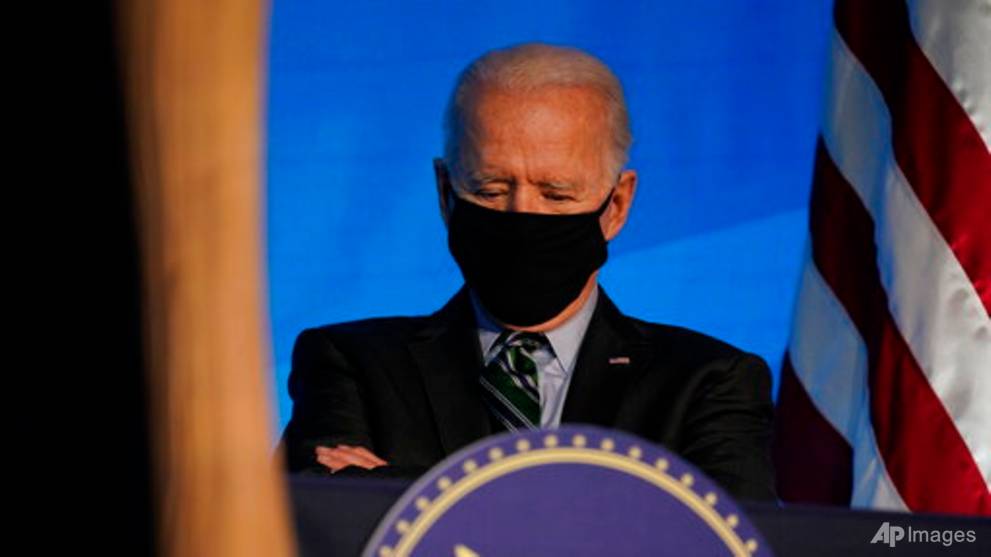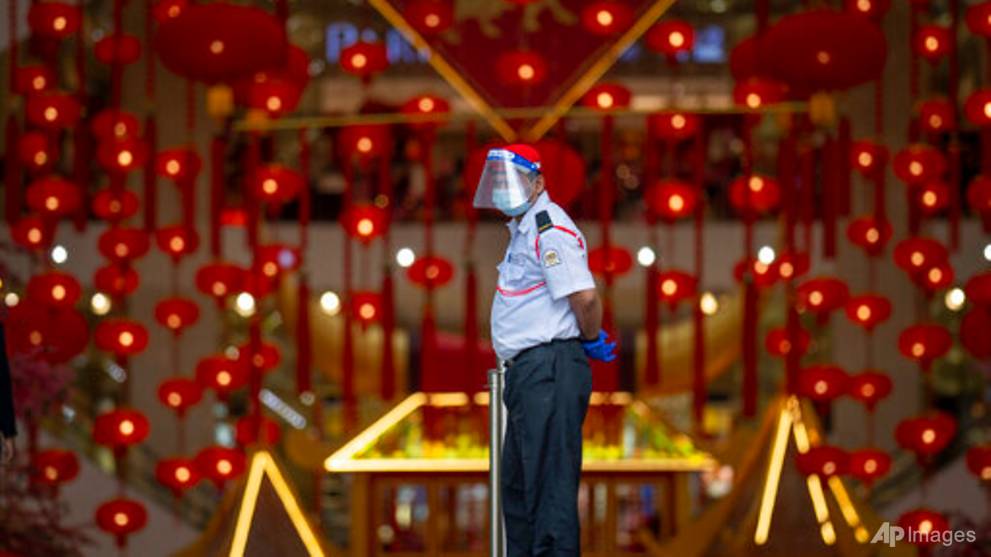WASHINGTON: Ten days after rioters breached the US Capitol in a deadly attack that stunned the world, cities nationwide were girding for a potential new wave of violent protests over the weekend, erecting barriers and deploying thousands of National Guard troops.
The FBI warned police agencies of possible armed demonstrations outside all 50 state capitol buildings starting Saturday (Jan 16) through President-elect Joe Biden's inauguration on Jan 20, fuelled by supporters of President Donald Trump who believe his claims of electoral fraud.
Michigan, Virginia, Wisconsin, Pennsylvania and Washington were among more than a dozen states that activated their National Guards to strengthen security.
Downtown Washington, DC, was virtually empty, with streets near the Capitol closed and battalions of camouflaged National Guard soldiers taking up positions across the city centre.
The nationwide security scramble followed the deadly Jan 6 attack on the US Capitol in Washington by a mix of extremists and Trump supporters, some of whom called for the death of Vice President Mike Pence as he presided over the certification of Biden's election victory.
READ: Biden outlines 'Day One' agenda of executive actions to undo some Trump decisions
READ: Washington locks down, Delta Air Lines bans guns to DC ahead of inauguration
The Democratic leaders of four US congressional committees said on Saturday they had opened a review of the events and had written to the FBI and other intelligence and security agencies asking what was known about threats, whether the information was shared and whether foreign influence played any role.
"This still-emerging story is one of astounding bravery by some US Capitol Police and other officers; of staggering treachery by violent criminals; and of apparent and high-level failures – in particular, with respect to intelligence and security preparedness," said the letter.
It was signed by House Intelligence chairman Adam Schiff, House Homeland Security chairman Bennie Thompson, House Oversight chairwoman Carolyn Maloney and House Judiciary Committee chairman Jerrold Nadler.
There were scattered demonstrations on Saturday, but statehouses remained mostly quiet. Law enforcement officials have trained much of their focus on Sunday, when the anti-government "boogaloo" movement made plans weeks ago to hold rallies in all 50 states.

Steve McCraw, director of the Texas Department of Public Safety, said in a statement late Friday that intelligence indicated "violent extremists" may seek to exploit planned armed protests in Austin to "conduct criminal acts". Texas closed its Capitol through Inauguration Day.
In Michigan, a fence was erected around the Capitol in Lansing, and troopers were mobilised from across the state to bolster security. The legislature cancelled meetings next week, citing concern over credible threats.
In a nod to both the coronavirus pandemic as well as security concerns, festivities around Biden's inauguration will largely be held online, though the president-elect still plans to be sworn in and deliver his inaugural address at the Capitol.
The inaugural committee's virtual "welcome event" took place on Saturday evening, featuring appearances from union leaders, activists and celebrities such as actress Whoopi Goldberg.
"Make no mistake, the road ahead - it won't be easy," Vice President-elect Kamala Harris, who closed out the event, told viewers. "But America is ready, and so are Joe and I."
READ: Trump plans to depart Washington the morning of Inauguration Day: Official
DOMESTIC EXTREMISTS
The perception that the Jan 6 insurrection was a success could embolden domestic extremists motivated by anti-government, racial and partisan grievances, spurring them to further violence, according to a government intelligence bulletin dated Wednesday first reported by Yahoo News.
The Joint Intelligence Bulletin, produced by the FBI, Department of Homeland Security and National Counterterrorism Center, further warned that "false narratives" about electoral fraud would serve as an ongoing catalyst for extremist groups.
Thousands of armed National Guard troops were on the streets of Washington in an unprecedented show of force after the assault on the US Capitol. Bridges into the city were to be closed, and the National Mall and other iconic US landmarks were blocked off into next week.
READ: Iran deal architect among veterans named for Biden State Department
READ: Biden names White House science adviser, elevates post to Cabinet-level position
Authorities were on high alert. A Virginia man, Wesley Allen Beeler, was arrested on Friday evening at a security checkpoint after police said he presented an "unauthorised inauguration credential," according to a Capitol Police spokeswoman. Beeler had a loaded handgun and more than 500 rounds of ammunition, according to court papers.
A tearful Beeler later told the Washington Post he had been working security in Washington all week and pulled up to the checkpoint after getting lost. He told the paper he forgot the gun was in his truck and denied having so much ammunition.
Beeler was released after an initial court appearance on Saturday and is due back in court in June, records show.
Responding to news of the arrest, Democratic US Representative Don Beyer of Virginia said the danger was real and the city was on edge.
"Anyone who can avoid the area around the Capitol and Mall this week should do so," Beyer wrote on Twitter.
The alarm extended beyond legislatures. The United Church of Christ, a Protestant denomination of more than 4,900 churches, warned its 800,000 members there were reports "liberal" churches could be attacked in the coming week.
Following the Jan 6 violence in Washington, some militia members said they would not attend a long-planned pro-gun demonstration in Virginia, where authorities were worried about the risk of violence as multiple groups converged on the state capital, Richmond.
Some militias across the country have told followers to stay home this weekend, citing the increased security or the risk that the planned events were law enforcement traps.
https://news.google.com/__i/rss/rd/articles/CBMiaWh0dHBzOi8vd3d3LmNoYW5uZWxuZXdzYXNpYS5jb20vbmV3cy93b3JsZC91cy1jYXBpdGFscy1hcm1lZC1wcm90ZXN0cy10cnVtcC1wcmVzaWRlbmN5LW5lYXJzLWVuZC0xMzk3NDE3MtIBAA?oc=5
2021-01-17 01:41:15Z
52781310165739



